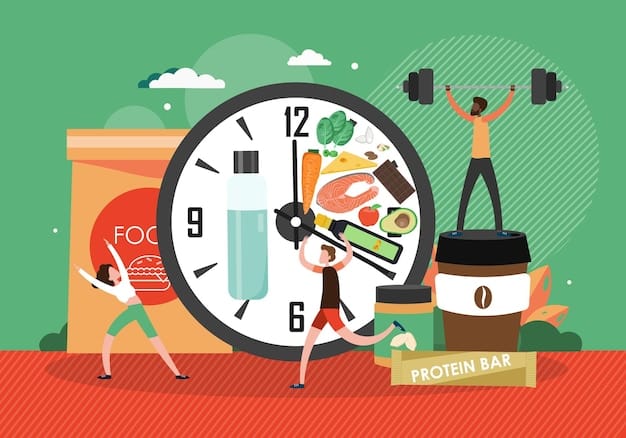Intermittent Fasting and Muscle Mass: Protein Timing and Anabolic Response

Intermittent fasting can be a practical dietary approach for managing weight and improving health; however, its impact on muscle mass, particularly when combined with specific protein timing strategies, requires careful consideration of individual anabolic responses.
Interested in intermittent fasting and muscle mass? This article explores new evidence on how protein timing can affect your anabolic response and muscle growth during intermittent fasting.
Intermittent Fasting: What is it?
Intermittent fasting (IF) is an eating pattern that cycles between periods of eating and voluntary fasting on a recurring schedule. It’s less about what you eat and more about when you eat.
There are various types of intermittent fasting, including:
- Time-Restricted Feeding (TRF): This involves eating during a specific window of time each day. For example, the 16/8 method, where you fast for 16 hours and eat during an 8-hour window.
- Alternate-Day Fasting (ADF): This involves alternating between days of normal eating and days of fasting or severely restricting calories.
- Whole-Day Fasting: This involves one or two days per week of fasting or severely restricting calories, with normal eating on the other days. An example is the 5:2 diet, where you eat normally for five days and restrict calories to 500-600 for two days.
Intermittent fasting is gaining popularity due to its potential health benefits, such as weight loss, improved insulin sensitivity, and cellular repair. It’s essential to choose a method that fits your lifestyle and health goals. Before starting any intermittent fasting regimen, it’s recommended to consult with a healthcare professional or registered dietitian, especially if you have underlying health conditions.

The Science Behind Muscle Protein Synthesis
Muscle protein synthesis (MPS) is the process by which your body repairs and builds muscle tissue. It’s a crucial factor in muscle growth, recovery, and overall body composition.
MPS is stimulated by various factors, including resistance exercise and protein consumption. When you lift weights or engage in other forms of resistance training, you create microscopic damage to your muscle fibers. This damage signals the body to initiate MPS to repair and rebuild the muscle tissue, making it stronger and larger over time.
Protein and MPS
Protein is essential for muscle protein synthesis. When you consume protein, it’s broken down into amino acids, which are the building blocks of muscle tissue. These amino acids are used to repair and rebuild damaged muscle fibers, stimulating muscle growth.
Other Factors Affecting MPS
- Age: MPS tends to decrease with age, making it more challenging to build and maintain muscle mass as you get older.
- Hormones: Hormones like testosterone and growth hormone play a significant role in MPS. Higher levels of these hormones can boost MPS, while lower levels can hinder it.
- Caloric Intake: Being in a calorie surplus (consuming more calories than you burn) generally supports MPS, while being in a calorie deficit (consuming fewer calories than you burn) can inhibit it.
Understanding the science behind muscle protein synthesis is critical for optimizing muscle growth and recovery. By combining resistance exercise with adequate protein intake and considering other factors like age and hormones, you can maximize MPS and achieve your fitness goals.
How Intermittent Fasting Affects Muscle Mass
Whether or not intermittent fasting can impact the way your body builds muscle mass can be a topic of debate. Some argue that IF can preserve or even enhance muscle mass while others contend that it can lead to muscle loss.
One of the primary concerns about intermittent fasting and muscle mass is the potential for reduced protein intake. When you restrict your eating window, you might find it challenging to consume enough protein to support muscle protein synthesis.
Studies and Research
Research on the effects of intermittent fasting on muscle mass has yielded mixed results. Some studies have shown that IF can be effective for weight loss without significant muscle loss, while others have indicated a potential for muscle loss, especially in untrained individuals.
Potential Benefits of IF for Muscle Mass
When combined with resistance training and adequate protein intake, intermittent fasting might offer some benefits for muscle mass:
- Improved Insulin Sensitivity: IF has been shown to improve insulin sensitivity, which can help shuttle nutrients, including amino acids, into muscle cells, promoting muscle growth.
- Increased Growth Hormone Levels: Some studies suggest that IF can increase growth hormone levels, which can support muscle protein synthesis.
- Enhanced Fat Loss: By promoting fat loss, IF can indirectly enhance muscle mass by improving body composition.
Overall, the impact of intermittent fasting on muscle mass depends on various factors, including the type of IF, the individual’s training status, protein intake, and overall diet. It requires careful planning to ensure that you’re consuming enough protein and calories to support muscle growth.

Protein Timing Strategies During Intermittent Fasting
Protein timing involves strategically consuming protein at specific times of the day to maximize muscle protein synthesis. When combined with intermittent fasting, protein timing can be a valuable tool to help preserve or even build muscle mass.
One of the most common protein timing strategies during intermittent fasting is to consume a larger portion of your daily protein intake during your eating window. This can help ensure that you’re providing your body with the amino acids it needs to repair and rebuild muscle tissue.
Pre- and Post-Workout Protein
Consuming protein before and after your workouts can also be beneficial for muscle protein synthesis. Protein before a workout can provide your muscles with the amino acids they need to perform, while protein after a workout can help repair and rebuild damaged muscle fibers.
Distributing Protein Throughout the Eating Window
Some people find it helpful to distribute their protein intake evenly throughout their eating window to keep a steady supply of amino acids available to their muscles. This can involve consuming smaller, more frequent protein-rich meals or snacks.
- Protein Supplements: Using protein supplements, such as whey protein or casein protein, can be a convenient way to increase your protein intake and optimize protein timing.
- High-Protein Foods: Focus on including high-quality protein sources in your diet, such as lean meats, poultry, fish, eggs, dairy products, and plant-based proteins like beans, lentils, and tofu.
- Individualization: The ideal protein timing strategy may vary depending on individual factors, such as training schedule, activity level, and metabolic rate. It’s essential to find a strategy that works for you and helps you achieve your fitness goals.
By strategically timing your protein intake during intermittent fasting, you can optimize muscle protein synthesis, preserve muscle mass, and enhance your overall fitness results.
Anabolic Response and Intermittent Fasting
The anabolic response refers to the body’s ability to build and repair tissues, including muscle tissue. Intermittent fasting can affect the anabolic response by influencing hormone levels, insulin sensitivity, and nutrient availability.
One of the key hormones involved in the anabolic response is insulin. Insulin is released when you consume carbohydrates and protein, and it helps transport nutrients into muscle cells, promoting muscle growth.
Impact on insulin levels
The impact that intermittent fasting has on insulin levels is that it can improve insulin sensitivity, which means that your body becomes more efficient at using insulin to shuttle nutrients into muscle cells. This can enhance the anabolic response and promote muscle growth.
Other Considerations
Factors to consider that also play a role in the anabolic response:
- Testosterone: Testosterone is another crucial hormone for muscle growth. Some studies suggest that intermittent fasting may increase testosterone levels, although more research is needed.
- Growth Hormone: As mentioned earlier, intermittent fasting can increase growth hormone levels, which can also support the anabolic response.
- Nutrient Timing: The timing of your meals and protein intake can also influence the anabolic response. Consuming protein-rich meals around your workouts can help maximize muscle protein synthesis.
Intermittent fasting can potentially enhance the anabolic response by improving insulin sensitivity and increasing growth hormone levels. However, it’s essential to ensure that you’re consuming enough protein and calories to support muscle growth.
Practical Tips for Combining Intermittent Fasting with Muscle Building
Successfully combining intermittent fasting with muscle building requires a strategic approach that considers all aspects of your diet and training regimen.
Make sure that you pick the right intermittent fasting schedule that fits your lifestyle and training goals. If you are new to fasting, start with a less restrictive approach and gradually increase the fasting duration as you become more comfortable.
Key considerations
To ensure that you are on the right track to achieve goals of combining intermittent fasting with muscle building, consider the following:
- Plan your meals in advance: Planning your meals in advance of your eating window can help you ensure that you’re consuming enough protein, carbohydrates, and healthy fats to support muscle growth.
- Prioritize Protein Intake: Aim to consume at least 1 gram of protein per pound of body weight per day. Focus on high-quality protein sources like lean meats, poultry, fish, eggs, and dairy products.
- Monitor Your Progress: Keep track of your weight, body composition, and strength levels to assess how your body is responding to the combination of intermittent fasting and muscle building. Adjust your approach as needed to optimize your results.
Combining intermittent fasting with muscle building can be a challenging but rewarding endeavor. By following these practical tips, you can potentially achieve your fitness goals while enjoying the benefits of both intermittent fasting and muscle building.
| Key Point | Brief Description |
|---|---|
| 💪 Muscle Protein Synthesis | Repair and build muscle tissue with protein. |
| ⏰ Protein Timing | Strategically consume protein to maximize muscle growth. |
| 🥗 Nutrient Intake | Consume adequate protein, carbs, and fats during eating windows. |
| 🔬 Anabolic Response | Optimize hormone levels for muscle building. |
FAQ
▼
Intermittent fasting can potentially lead to muscle loss if not properly managed. Maintaining adequate protein intake and incorporating resistance training is crucial to mitigate this risk.
▼
The best strategy varies, but generally, consuming a larger portion of your daily protein during your eating window, especially around workouts, is recommended to support muscle protein synthesis.
▼
Yes, intermittent fasting has been shown to improve insulin sensitivity, which can help shuttle nutrients into muscle cells, potentially enhancing muscle growth and overall anabolic response.
▼
Aim for at least 1 gram of protein per pound of body weight per day. This ensures that your body has enough building blocks to repair and build muscle tissue during your eating window.
▼
Yes, it is possible to build muscle while intermittent fasting. This requires a well-planned diet, adequate protein intake, strategic protein timing, and consistent resistance training to stimulate muscle protein synthesis.
Conclusion
Combining intermittent fasting and muscle mass requires careful planning and execution. By understanding the science behind muscle protein synthesis, implementing effective protein timing strategies, and optimizing your anabolic response, you can potentially achieve your fitness goals while enjoying the benefits of intermittent fasting.





